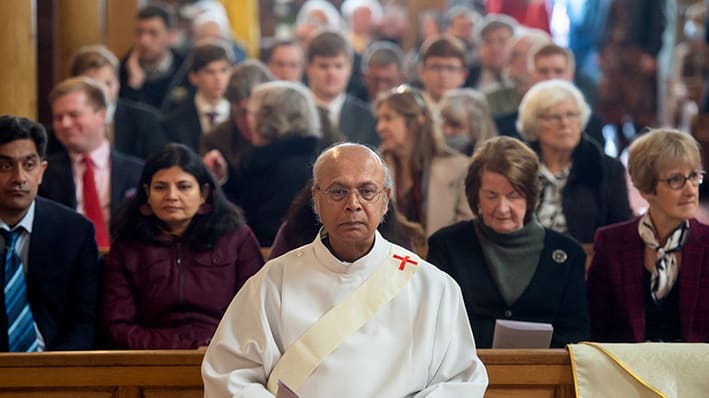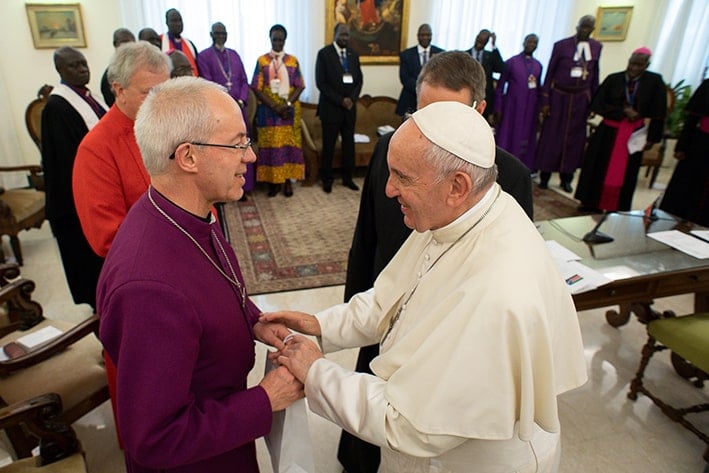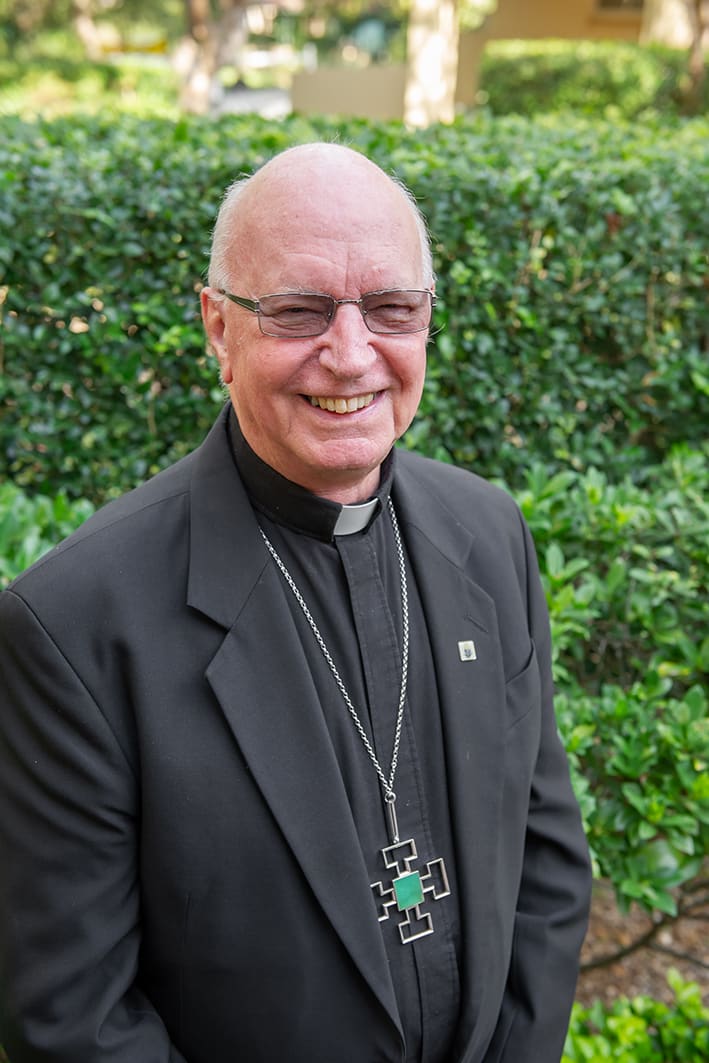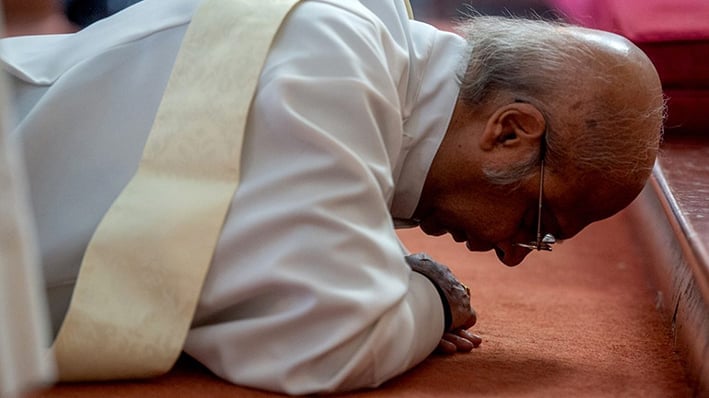
The conversion to Catholicism of a former Anglican bishop is being watched closely in both Anglican and Catholic circles
Former Anglican Bishop Michael Nazir-Ali was ordained to the Catholic priesthood on 30 October at the Church of Our Lady of the Assumption and St Gregory, London, in what Cardinal Archbishop Vincent Nichols described as “a moment of great joy”.
Nazir-Ali’s decision to enter the Personal Ordinariate of Our Lady of Walsingham is a familiar phenomenon: Bishops John Goddard and Jonathan Goodall both joined the Catholic Church in 2021, among others, and are the latest in a steady stream of Anglican clergy in recent years.
His decision to “swim the Tiber” is unusual, however, for two reasons that make this British conversion of particular interest to Australians, both Catholic and Anglican.
First, as many reports have remarked, Nazir-Ali did not come from the “high church” Anglo-Catholic tradition from which many Ordinariate clergy are drawn. He was a leading figure in the Anglican communion’s evangelical wing, which favours the “reformed” character of Anglicanism and treats its liturgical and sacramental tradition more gingerly.
More important was Nazir-Ali’s status as a powerhouse of the Global Anglican Futures Conference (GAFCON) movement, a global push by the evangelical wing of the church to reform Anglicanism.
Launched in 2008 at a conference in Jerusalem, GAFCON aims to restore its view of orthodoxy in the wake of the preaching of a “different gospel” by the liberal Anglican broad church.

Its founding conference produced the influential “Jerusalem Statement”, which has become for evangelicals the litmus test of Anglican orthodoxy.
It identified three major issues: the acceptance and promotion of same-sex marriage, the declaration by the “Global South” – most notably the diocese of Sydney and the large, dynamic Anglican churches of Africa – that they were leaving communion with Bishops who promoted same-sex marriage, and what GAFCON saw as the “manifest failure” of Anglicanism’s structures to discipline the church.
Nazir-Ali, an important driving force behind GAFCON, said in 2008 that attendees at its first conference were the “miraculous beginnings of a new ecclesial movement for the sake of the Gospel”.
His former colleagues in England, including the Archbishop of Canterbury, have been largely conciliatory, even foreshadowing ways for him to continue a collaboration with GAFCON; the strongest criticism of Nazir-Ali’s conversion came from Australia.
The board of GAFCON Australia expressed in a statement “its grief and sadness that Bishop Michael Nazir-Ali has decided to leave the Church of England”.
“We are confused about how Bishop Michael has come to the decision he has made. We continue to believe that the official teaching of the Roman Catholic Church is in error in several key respects which makes Bishop Michael’s decision one which we cannot understand or endorse.”
GAFCON Australia’s remarks on Nazir-Ali’s conversion reiterated its commitment to support “those who are marginalised by the unorthodox actions of others”.
In recent months this support has taken the form of commitments to pull away from the rest of the Anglican Church in Australia, which received a stern reply from the Anglican Archbishop of Melbourne, Philip Freier.
In an Ad Clerum letter of August this year, Freier compared GAFCON to the 2012 establishment of the Australian Anglican Ordinariate.
In a carefully-worded rebuke, Freier wrote that “Church division is always painful … we have some experience at rebuilding parish ministries after the loss of leadership”.
GAFCON disagrees – and does not appreciate the comparison with those who joined Rome – citing broad church Anglicanism’s declining congregations as evidence a new approach is needed.
Perhaps ironically, the Anglo-Catholic wing of the church from which the Ordinariate departed also acknowledges (privately) that its own tradition is cratering.
What seems to be agreed upon by everyone is that something must change if the Anglican patrimony is to be rescued.
I believe that the Anglican desire to adhere to apostolic, patristic and conciliar teaching can now best be maintained in the Ordinariate.”
Former Anglican Bishop
Michael Nazir-Ali
Yet after spending over a decade promoting GAFCON’s international solution to the problems of global Anglicanism, Nazir-Ali decided ultimately that salvation lay with Rome.
Speaking to The Catholic Weekly, David Ould, an Anglican minister at St John’s Cathedral in Parramatta and commentator on Anglican church issues, called Freier’s remarks a “false comparison”.
“Those that have joined the Ordinariate have made a conscious decision to leave Anglicanism for an alternate theology.
“GAFCON is almost the opposite – it’s an attempt to remain faithful to Anglican theology in the face of church leaders who either deny our agreed doctrine or do nothing to defend it.”
Ould is referring to a flashpoint event in Australian Anglicanism: the decision by the Anglo-Catholic-leaning Anglican Diocese of Wangaratta to bless same-sex relationships in 2019.
Wangaratta wished to bless the marriage of two priests, John Davis and Rob Whalley, but was stayed by Freier, at that time serving as Anglican Primate of Australia. Newcastle also voted to bless same-sex marriages after their legalisation.
In 2020 the matter was referred to the Appellate Tribunal – Anglicanism’s highest ecclesiastical tribunal – which in a controversial opinion said that the proposed services of blessing could proceed, given they were not intended to solemnise same-sex marriages, but to bless those already legally contracted under Australian law.
“It is not the Appellate Tribunal’s role to attempt the often impossible task of settling doctrinal let alone factional disputes within the Anglican Church of Australia,” the Tribunal’s decision noted.
“For me, in the midst of what happened in 2019 we’ve continued our ministry and preaching the Gospel to people. It’s a ministry of total inclusivity to God’s people – regardless of who they are,” the Bishop of Wangaratta, Clarence Bester, told The Catholic Weekly.
Bester said that “the last three years have been so difficult. People need to find themselves again.”
“They need to rekindle the flame in their lives, and fall in love with Jesus. I don’t want to see anything that will keep people away from the love of Jesus.”
Regarding GAFCON’s focus on same-sex marriage as a clear dividing line in the Anglican church, Bester said the church has always managed to “walk together” while disagreeing on many issues.
More important for him personally was reconnecting in the wake of the COVID-19 pandemic.
“I’d like a moment to see my son, who I’ve not seen for months. We forget the church was established on those family values.”
Australia’s Anglican Bishops had previously agreed in 2018 to “manifest and maintain unity” on the issue of same-sex marriage and the decision by Wangaratta to proceed was viewed by evangelicals as a confirmation that the church could not maintain its own discipline. The Appellate Tribunal’s decision prompted GAFCON Australia to announce in late 2020 that they intended to establish a new “extra-territorial” diocese for Anglicans “who will be forced to leave the Anglican Church of Australia”.
Similar structures have been erected in the USA, Canada and recently in New Zealand, drawing comparisons, such as Freier’s, with the formation of the various traditional or “continuing” Anglican movements of past decades that sought union with Rome and culminated in the establishment of the Ordinariates.
“We’ve effectively had two parallel Communions for a while, ever since successive Archbishops of Canterbury failed to uphold and enact agreed disciplinary measures. Events such as this serve only to further crystallise that reality,” Ould said.
Regarding GAFCON’s proposal, Bishop Bester said, “They need to do what they need to do, but we stay within the framework of where we are and continue to work within that framework.”
A further question for Anglicans of the broad church and Anglo-Catholic traditions, however, is whether GAFCON and the Sydney evangelical movement’s interpretation of orthodoxy represents the true Anglican patrimony, not only insofar as it rejects much of the Catholic liturgical heritage of the Church of England, but also in its commitment to reformed Protestant theology.
It has been a shock for us to leave the battlefield of Anglicanism where the whole thing has gone belly-up, as it were, and to find the same argument is going on in the Catholic Church.” Monsignor Harry Entwistle
Nazir-Ali, in comments explaining his desire to seek union with Rome, said “I believe that the Anglican desire to adhere to apostolic, patristic and conciliar teaching can now best be maintained in the Ordinariate.”
Monsignor Harry Entwistle, a former Anglican Bishop who joined the Catholic Church in 2012 and became the founding Ordinary of the Australian Ordinariate of Our Lady of the Southern Cross, told The Catholic Weekly that Nazir-Ali’s sentiments were similar to his own.

“Although it happens at different times for different people, there’s a realisation that – for those of us who value Anglicanism and were born and bred and brought up in Anglicanism – the Anglican world that now exists is a far cry from what was.
“Gone are the beliefs that we were holding on to Catholic threads, and that we were a branch of the One Holy Catholic Church.”
For those Anglicans unable to accept what Entwistle describes as the increasing “Calvinistic” theology of GAFCON, the Ordinariate remains one way of “completing the Reformation” by bringing the treasures of Anglican scholarship, liturgy and culture back into union with the Holy See where it can be preserved and shared.
“[Nazir-Ali] too has come to realise that the Church of England as he knew it, is no longer the reality,” Entwistle said.
Anglican minister David Ould disagrees that Nazir-Ali’s decision was a rejection of the movement he helped to create:
“I suspect that [his] move is less to do with any perceived insufficiency of GAFCON’s approach and much more to do with a perception that the Church of England was “too far gone”, despite any good work that GAFCON could do,” he said.
GAFCON … is an attempt to remain faithful to Anglican theology in the face of church leaders who either deny our agreed doctrine or do nothing to defend it.”
David Ould, St John’s Anglican Cathedral, Parramatta
Anglicans of the broad church and Anglo-Catholic traditions were reticent to speak on the record with The Catholic Weekly, or indeed at all, in part because of the looming 2022 General Synod at which many of these issues will come to a head.
Anglo-Catholicism as a movement within the Australian Anglican church is much reduced from its status as the dominant force within many Australian dioceses in the middle of last century, and finds itself increasingly quarantined within evangelical-led dioceses.
Nevertheless, the proposal by GAFCON to create a parallel church structure in Australia is regarded by some as “bluster and bravado”, due to the legal complexities involved in taking an Archdiocese like Sydney out of existing structures, and because of an overestimation of support for such a move.

Monsignor Carl Reid, another Episcopal convert from Anglicanism who succeeded Entwistle as Australian Ordinary, describes contemporary Anglo-Catholicism as an “empty shell”.
Without “good firm Catholic teaching”, Anglican “high churchmanship” – which once entailed a “high” theological and ecclesiological view, in addition to bells and smells – “collapses into pure ritualism”, Reid said.
Surviving Anglo-Catholic communities are often comprised of those who were initially intrigued by the prospect of unity with Rome in the 1990s but could not overcome distrust of Rome, or who are committed to theological positions incompatible with Catholic teaching.
“This explains why we aren’t being flooded by Anglo-Catholics anymore,” Reid said. “For many of them the ship has sailed.”
He added that he hopes Nazir-Ali’s conversion “will have a thought-provoking effect on Anglicans of all cross-sections.”
Whether GAFCON’s proposal to create an “extra-territorial” Anglican diocese goes ahead, 2022 will be a watershed year for the Anglican Church in Australia – and not just because of its General Synod.
The Archbishop of Canterbury will convene the next Lambeth conference next year, a gathering of the broad church perennially threatened with boycotts by evangelicals, that risks entrenching divisions over what constitutes Anglican orthodoxy rather than resolving them.
“This is why Bishops are leaving the Anglican church and becoming Catholic,” Monsignor Entwistle said.
“The English, of course, are brilliant at living with division while pretending not to.
“It has been a shock for us to leave the battlefield of Anglicanism where the whole thing has gone belly-up, as it were, and to find the same argument is going on in the Catholic Church.
“The broader Catholic Church has really got to listen to the experience of the Ordinariate. We need to be asked ‘What was our experience in Anglicanism over the last 30, 40 years – how did things fall apart?’”
